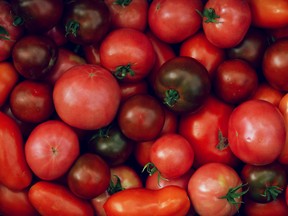California's problems will cause major changes in the way commodities are grown, imported, and exported

It's tomato season. Canadians love tomatoes. It is the most popular vegetable in supermarkets. According to Agriculture and Agri-Food Canada, the average Canadian consumes at least 6-7 kilos of tomatoes per year. Each year, Canadians have access to over 12 kilos of fresh processed tomatoes per person. We waste a lot, but we have a lot to come and go.
Tomatoes are her fifth largest vegetable crop in Canada, after corn, beans, peas and carrots. However, when it comes to greenhouse-grown vegetables, tomatoes are Canada's top crop. After peppers, tomatoes are the top vegetable exports from our own growers here in Canada. However, we import many tomatoes, mainly from Mexico and the United States. Surprisingly, Canada has a very similar import to export ratio. Many provinces have made efforts to increase the number of environmentally controlled farming projects to grow more food in the country.
California is a major supplier of processed tomatoes to Canada, the world's largest producer. Many tomato-based products can be found on Canadian grocery shelves, including sauces, salsas, and soups. But California has problems with its water supply. We are literally running out of water and we hear all the time about farmers struggling to grow anything in such drought conditions.
California is experiencing its worst drought in 1,200 years, according to recent reports, affecting many crops, including tomatoes. Some have even speculated that we might run out of spaghetti sauce — certainly prices might go up, but Canada is unlikely to run out of spaghetti sauce. For one, there are many great local products that are often overlooked by consumers looking only for specific brands. We also have a lot of tomatoes here in Canada, and the sauce is easy to make. We have many things to worry about, but we never run out of spaghetti sauce. That will mean a big change in how we connect our farms' fields with what we consume every day.And that change is happening very quickly.
Recommended Video
For growers and growers, the once invisible carbon energy, coupled with Mother Nature's wrath, is now costly. It has a big impact. Energy consumption to produce, process and transport food is becoming more expensive. Putting a price on carbon forces companies to strategize differently. Growers and processors are now forced to think differently about how to serve markets, including Canada. In other words, our farming and food world is becoming much smaller. I know that you have partnered with Driscoll's is one of the world's largest fruit producers and has had to face water shortages. The deal sees Canadian farmers in British Columbia and Quebec undertake cultivation work for her Driscoll, while also receiving Driscoll's know-how, including genetics and growing expertise. This is worth a lot of money and time. Driscoll's smart move actually benefits both Canadian producers and consumers.
-

Charlevoix: Extreme diets are bad policies
{ -

Charlevoix: The Real Behind Rising Milk Prices
Fundamentally, the fundamentals of business for companies like Driscoll are changing. Not only do you need to be close to the markets you want to serve, you also need valuable resources that were once abundant in California. Climate change is undoubtedly changing the economics of tomato cultivation. A partnership like this between our farmer and the Californian giant is a perfect example of an onshoring business, and you can expect to hear more about such moves in the years to come.
The future global agricultural trade will not necessarily be limited to trading bananas, beef, wheat and apples.It is about intellectual property, genetics and branding. Trade is ultimately about sharing, so what we share changes. Less specific, but focused on finding the most economically sustainable way to supply the market, exporting actual food may not be the best option going forward. There is a nature.
This is the kind of globalization that we will continue to see.
— Dr. Sylvain Charlebois is professor and senior director of the Institute for Agro-Food Analytics at Dalhousie University and co-host of The Food Professor podcast
twitter.com/foodprofessor

From the newsroom to your inbox at noon, the latest headlines, Stories, opinions and photos from the Toronto Sun.
Thank you for registering.
Sending welcome email. If you don't see it, please check your spam folder.
The next issue of Your Midday Sun will arrive in your mailbox shortly.


